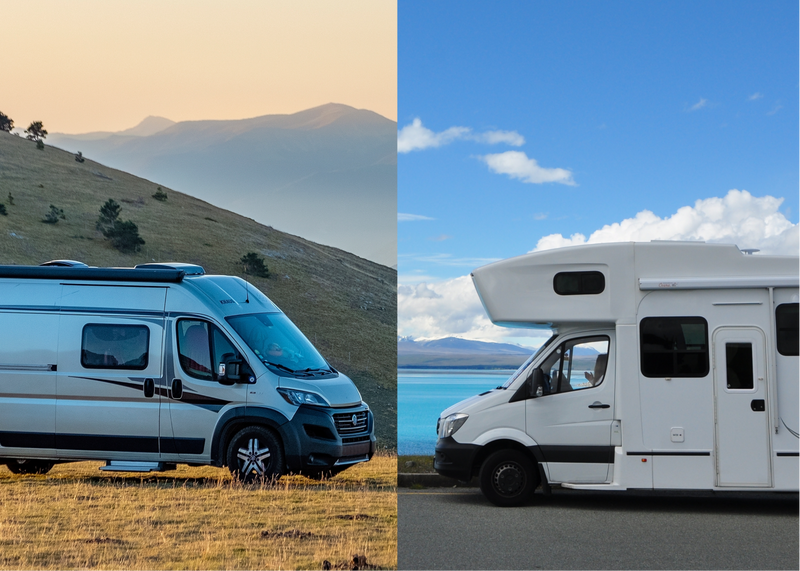Exploring the Pros and Cons: Van Life or RV Living
Posted by Heatso on 10th Jun 2023
Many adventurers seek freedom, flexibility, and a deeper connection with the world around them by embarking on a nomadic lifestyle. Van life and RV living have recently emerged as amazing travel methods for those craving life on the open road. But how do you choose between these two?
EXPLORING THE PROS AND CONS: VAN LIFE OR RV LIVING
Many adventurers seek freedom, flexibility, and a deeper connection with the world around them by embarking on a nomadic lifestyle. Van life and RV living have recently emerged as amazing travel methods for those craving life on the open road. But how do you choose between these two?
In order to live the van life to the fullest, picking the right option is crucial. Before embarking on your trip, you need decide what you prefer - Camper van vs. RV. By considering factors such as mobility, reliability, and accessibility, we will help you choose the best solution available.
ON THIS PAGE
CONSIDERATIONS OF VAN LIFE AND RV LIVING
There are several key factors to consider when choosing between van life and RV living. In order to live the van life to the fullest, motorhome enthusiasts should carefully select their van. The Mercedes Sprinter, Ford Transit, and Ram ProMaster are some of the best vans for van life. They offer plenty of space, reliability, and customization potential, making them perfect for living off-grid.
RVs, or recreational vehicles, provide a self-contained living experience with a wide range of amenities. RVs are a broad range of vehicles that include some of the amenities of an on-grid home. They come in 3 classes of different sizes, usually with a bathroom, kitchen, and bedroom ranging from basic to luxurious.
DRIVING EXPERIENCE
Comparing Fuel Efficiency in Vans and RVs
Vans and RVs have completely different fuel consumption, which is an important consideration. Vans typically achieve 18-22 miles per gallon (MPG), which is an advantage in general. But it becomes especially useful when you are in an area with limited options to refuel.
Due to their larger size and weight, RVs are generally less fuel-efficient. Class A motorhomes average around 6-10 MPG, while Class C motorhomes achieve around 8-12 MPG. The higher the RV, the more fuel it consumes, making trip planning and planning a budget more important.
Mobility and Accessibility on the Road
Vans and RVs offer unique advantages in regard to mobility. Due to their compact size, vans are excellent at maneuvering narrow roads, tight parking spots, and crowded city streets. Their compact size makes them better for exploration and accessing remote camping spots.
Though RVs offer less flexibility, they provide spacious living spaces and amenities. However, their mobility can be more limited. Driving an RV on off-roads or making sharp turns can be challenging. Accessibility may also be restricted at some scenic locations or campgrounds due to RV length restrictions
AMENITIES: SLEEPING, LIVING, AND STORAGE
Sleeping Arrangements in Vans and RVs
Van beds can range from simple platform beds to elaborate setups with built-in storage. Individuals or couples can easily get a good night’s sleep in a van and feel comfortable. There is, however, no room for additional guests. Some would argue that a small sleeping space would just add to the coziness inside!
On the other hand, RVs offer a wide range of sleeping options due to their larger size. Class B motorhomes and campervans often feature foldable beds, convertible dinettes, or overhead sleeping compartments. Class A and Class C motorhomes typically offer dedicated bedrooms with larger beds and additional sleeping spaces like sofa beds or bunk beds. RVs are ideal for families or groups of people traveling together due to their spacious sleeping quarters.
Comfort and Convenience on the Road
Compared to vans, RVs offer more comfort and convenience. Fully equipped kitchens, bathrooms, and climate control systems are common features in RVs. Many RVs also come with built-in toilets as separate units or as part of the layout.
Vans, on the other hand, are not always equipped with bathroom facilities. Some van conversions may include portable or compact cassette toilets that can be stored and used when needed. It may require more innovative solutions to meet bathroom needs, but van life is all about creativity and adventures on the road.
Organizing your belongings
RVs have a clear advantage over vans when it comes to storage space. Numerous storage options make it easier to bring along a wide range of belongings for longer trips or extended stays, such as bicycles, kayaks, and other leisure equipment.
Due to their smaller size, vans have limited storage space. However, the space can be maximized by using creative storage solutions such as overhead cabinets, under-bed compartments, and modular storage systems. Keeping your van organized and functional requires prioritizing essential items and regularly decluttering.
OPTIONS FOR SPENDING THE NIGHT
Finding the Perfect Spot for Overnight Stays
When it comes to choosing where to spend the night, there's a distinct difference between RVs and motorhomes. Both van life and RV living offer a certain amount of flexibility. Still, vans have better maneuverability, giving you more options to choose from. As a bonus, waking up with a breathtaking view from your secret camping spot is one of the perks of the RV vs. motorhome lifestyle.
On the other hand, RVs require more consideration when it comes to selecting overnight spots. RV parks and campgrounds specifically designed to accommodate larger recreational vehicles become popular choices for RV enthusiasts. These locations offer amenities such as electrical hookups, water connections, and dump stations, catering to the needs of RVers. Additionally, designated areas are available for socializing with fellow travelers, fostering a strong sense of community within the RV vs. motorhome community
Maintaining a clean campsite
One advantage that van lifers often have over RV owners is the ease of maintaining a clean and clutter-free campsite. Typically, vans have fewer items and a smaller living space, so they require less cleaning and organizing. Van owners know how to prioritize essential items and keep their living area tidy due to limited storage space.
RVs, with their larger living spaces and additional storage, have the potential to gather more belongings and require more regular cleaning. However, RVers usually adopt minimalist lifestyles and prioritize organization to maintain clean and functional living space. Utilizing storage compartments, cleaning regularly, and practicing good housekeeping habits can help RV owners keep their campsite clean and enjoyable.
RV LIVING EXPENSES COMPARED TO VAN LIFE
Motorhome Price Range Comparison
RVs, from Class A motorhomes to Class C motorhomes, offer various options to suit all budgets. Due to their size and luxury, Class A motorhomes are often more expensive. Prices for new Class A motorhomes can start from around $100,000 and can cost upwards of a million dollars for top-of-the-line models. Class C motorhomes, which are smaller and more affordable, generally range from $50,000 to $150,000.
In comparison, vans are more budget-friendly. While DIY conversions can be more affordable, professionally built van conversions can range from $40,000 to $100,000 or more. Pre-conversion vans can be purchased for a wide range of prices, ranging from around $20,000 for used models to over $100,000 for new, high-end models.
Getting your van or RV insured
Regardless of whether you live in a van or an RV, you need adequate insurance coverage to protect your vehicle and belongings. Insuring an RV typically requires an RV insurance policy, which offers coverage specific to motorhomes and their unique risks. RV insurance can include liability coverage, collision and comprehensive coverage, personal belongings coverage, and more.
For van owners, insurance options may include personal auto insurance or specialized van insurance policies. Personal auto insurance policies may not fully cover the unique needs of van conversions and are rather costly. Van-specific insurance policies are available and can provide coverage tailored to van life. This includes protection for the conversion components and personal belongings.
SUMMARY: PROS AND CONS OF VAN LIFE AND RV LIVING
Both lifestyles offer distinct experiences and travel opportunities in the RV vs. van life debate.
Vans are fuel-efficient, cost-effective, and enable discrete camping. There are, however, some disadvantages, including limited space, basic amenities, and comfort during extreme weather conditions.
On the other hand, RV living offers spaciousness, enhanced amenities, and year-round comfort. RVs provide a home-like environment with larger sleeping areas, fully equipped kitchens, and bathrooms.
Ultimately, the decision is up to you! It depends on your own preferences, your budget, and the amenities you desire. Consider the trade-offs between freedom and space, convenience, and the associated costs. Both van life and RV living allow for unique experiences on the road, so choose the option that best aligns with your lifestyle.
SUMMARY: PROS AND CONS OF VAN LIFE AND RV LIVING
Both lifestyles offer distinct experiences and travel opportunities in the RV vs. van life debate.
Vans are fuel-efficient, cost-effective, and enable discrete camping. There are, however, some disadvantages, including limited space, basic amenities, and comfort during extreme weather conditions.
On the other hand, RV living offers spaciousness, enhanced amenities, and year-round comfort. RVs provide a home-like environment with larger sleeping areas, fully equipped kitchens, and bathrooms.
Ultimately, the decision is up to you! It depends on your own preferences, your budget, and the amenities you desire. Consider the trade-offs between freedom and space, convenience, and the associated costs. Both van life and RV living allow for unique experiences on the road, so choose the option that best aligns with your lifestyle.












